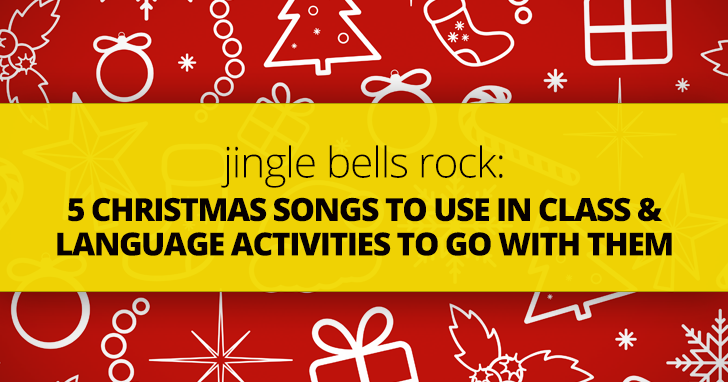Top 10 Christmas Songs for ESL Classes


Okay, you may not have an actual goose nearby, but Christmas is coming, and it’s coming sooner than you think. That makes now the perfect time to do some classroom activities with Christmas songs. If you have the skills and a piano nearby, you can certainly plan a sing along for your classroom, but there are other more purposeful (and easier to achieve) activities you can do with your ESL students. Here are some ideas for you to try, each based a traditional Christmas song. They will get your students talking, writing, and having a great time as the holiday season approaches.
We wish you a merry Christmas, we wish you a merry Christmas, we wish you a merry Christmas and a happy new year.
Christmas is a wonderful time of year, a time when old friends and distant family take time to connect with each other. Often these connections with the ones we love come in the form of Christmas cards. It is quite common for people to send well wishes within a gilt envelope as the year draws near its end. After listening to and/or singing “We Wish You a Merry Christmas” have a class discussion about the wordings you might use to send Christmas greetings. Brainstorm a list with your class. (Your list might include expressions such as happy holidays, merry Christmas, happy Chanukah, well wishes for the New Year, etc.) Once you have your list, give your students a few old Christmas cards (your coworkers will probably be willing to donate some of their extras from last year) and add to your list. Finally, give your students some time to design and create their own Christmas cards in which they write their own Christmas wishes. If you like, review how to address an envelope and mail your Christmas greetings to family and friends.
I’m dreaming of a white Christmas just like the ones I used to know. Where the treetops glisten and children listen to hear sleigh bells in the snow.
Irving Berlin, who wrote “White Christmas,” wasn’t the first person to be nostalgic about childhood holidays, and he certainly won’t be the last. For many people, holidays are a time which evokes thoughts of family. When Berlin wrote his famous tune, he was in California remembering the snowy Christmases he was accustomed to in the East. What memories does Christmas or another holiday evoke in you? What does it evoke in your students? Is it certain people? A place they love? Meaningful traditions? What for your students would make the perfect holiday? Give your students a chance to talk through these questions and then share their thoughts and memories with their classmates. After their discussions, they can use the lyrics to white Christmas as inspiration to write about their own Christmas memories in their own descriptive writing, putting down in words what they imagine as the perfect holiday celebration. You will have something to celebrate as their teacher, too since your students will be getting a good review of mixed past tenses.
I want a hippopotamus for Christmas. Only a hippopotamus will do. Don’t want a doll, no dinky tinker toys. I want a hippopotamus to play with and enjoy.
As a child, did you take time out to write a Christmas list for family and friends? Perhaps you wrote a letter to Santa telling him all of your Christmas wishes. And while mom and dad might have practical reasons for their kids to write a wish list to Santa, kids find joy in the process, looking through toy catalogs and numbering on the page the presents they dream of receiving. Sing along to “I Want a Hippopotamus for Christmas” with your students and then ask them to think of five to ten things they would like for Christmas. Ask students to number their list on the page, but don’t’ stop there. Have students write out why they want each item and what they will do with it once they get it. It’s a great opportunity to both learn more about your students and to practice conditionals in English.
Frosty the snowman was a jolly, happy soul with a corn cob pipe and a button nose and two eyes made out of coal.
Generations of American children have fallen in love with that magical “Frosty the Snowman.” Every year at the right time, you can find the cartoon movie on television. But you don’t have to scour through the TV guide to show it to your students. You can watch it here on YouTube. After showing the video to your class (and having them listen to the song), give them a list of the major events in the story in random order. Then have groups of three work together to put the events in the right sequence. If you want to give your students an even bigger challenge, give each of the three group members three of the events and tell them they cannot show their papers to their group members. They will have to communicate even more to get all nine events in the correct order. This is a great speaking exercise for ESL students as well as a useful activity for using sequencing language.
If you’re Rudolph and you know it, flash your nose.
Odds are you haven’t heard this Christmas version of if you’re happy and you know it, but the free printable makes for a fun and jolly Christmas activity. Print out two copies of the double sided cards. Separate them, and put one set in a bag and distribute the other set to your students. Then pull a card out of the bag and sing that verse with your students. As you do, the student holding that card must do the action in the verse. Your students will have fun singing along with this silly song while they practice their listening skills and get into the spirit of the season.
Introduce your class to some of these fun holiday tunes and know that they will be improving their language skills through the activities that go along with them.